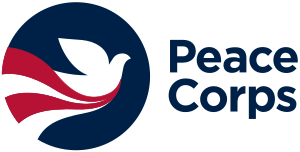Peace Corps
Peace Corps is a volunteer program run by the United States government. Its official mission is to provide social and economic development abroad through technical assistance, while promoting mutual understanding between Americans and populations served. Established by Executive Order 10924 issued by President John F. Kennedy on March 1, 1961, and authorized by Congress later that year, the agency has sent over 240,000 Americans to serve in 141 countries.
History
The Peace Corps was established during the Cold War era as a part of Kennedy's New Frontier program. It aimed to counter the stereotype of the "ugly American" and "Yankee imperialism," especially in the newly independent nations of Africa and Asia. The idea was first proposed by then-Senator Kennedy during an impromptu speech at the University of Michigan in Ann Arbor, on October 14, 1960. The enthusiastic response from students to his challenge of serving their country in the cause of peace by living and working in developing countries led to the establishment of the Peace Corps.
Mission and Goals
The Peace Corps' mission has three simple goals:
- To help the people of interested countries in meeting their need for trained men and women.
- To help promote a better understanding of Americans on the part of the peoples served.
- To help promote a better understanding of other peoples on the part of Americans.
Volunteer Work
Volunteers are American citizens, typically with a college degree, who work abroad for a period of two years after three months of training. They are assigned to projects that fit their skills and interests, in sectors such as education, health, community economic development, environment, agriculture, and youth in development. Despite the challenges, many volunteers find their service to be a transformative experience, leading to a lifelong commitment to service and global engagement.
Administration and Structure
The Peace Corps is headed by a Director, nominated by the President and confirmed by the Senate. The agency is organized into regional offices that oversee programs in specific countries. The Peace Corps maintains a headquarters in Washington, D.C., and has a network of recruitment and support offices throughout the United States.
Impact and Criticism
The impact of the Peace Corps has been widely debated. Proponents argue that it has been effective in promoting international understanding and goodwill, and in providing valuable assistance to developing countries. Critics, however, contend that its impact has been minimal and that it sometimes serves more as a tool of American foreign policy than as a genuine development agency. Despite these criticisms, the Peace Corps remains a unique and iconic American institution, known for its commitment to service and peace.
See Also
| This article is a stub. You can help WikiMD by registering to expand it. |
Transform your life with W8MD's budget GLP-1 injections from $125.
W8MD offers a medical weight loss program to lose weight in Philadelphia. Our physician-supervised medical weight loss provides:
- Most insurances accepted or discounted self-pay rates. We will obtain insurance prior authorizations if needed.
- Generic GLP1 weight loss injections from $125 for the starting dose.
- Also offer prescription weight loss medications including Phentermine, Qsymia, Diethylpropion, Contrave etc.
NYC weight loss doctor appointments
Start your NYC weight loss journey today at our NYC medical weight loss and Philadelphia medical weight loss clinics.
- Call 718-946-5500 to lose weight in NYC or for medical weight loss in Philadelphia 215-676-2334.
- Tags:NYC medical weight loss, Philadelphia lose weight Zepbound NYC, Budget GLP1 weight loss injections, Wegovy Philadelphia, Wegovy NYC, Philadelphia medical weight loss, Brookly weight loss and Wegovy NYC
|
WikiMD's Wellness Encyclopedia |
| Let Food Be Thy Medicine Medicine Thy Food - Hippocrates |
Medical Disclaimer: WikiMD is not a substitute for professional medical advice. The information on WikiMD is provided as an information resource only, may be incorrect, outdated or misleading, and is not to be used or relied on for any diagnostic or treatment purposes. Please consult your health care provider before making any healthcare decisions or for guidance about a specific medical condition. WikiMD expressly disclaims responsibility, and shall have no liability, for any damages, loss, injury, or liability whatsoever suffered as a result of your reliance on the information contained in this site. By visiting this site you agree to the foregoing terms and conditions, which may from time to time be changed or supplemented by WikiMD. If you do not agree to the foregoing terms and conditions, you should not enter or use this site. See full disclaimer.
Credits:Most images are courtesy of Wikimedia commons, and templates, categories Wikipedia, licensed under CC BY SA or similar.
Contributors: Prab R. Tumpati, MD






